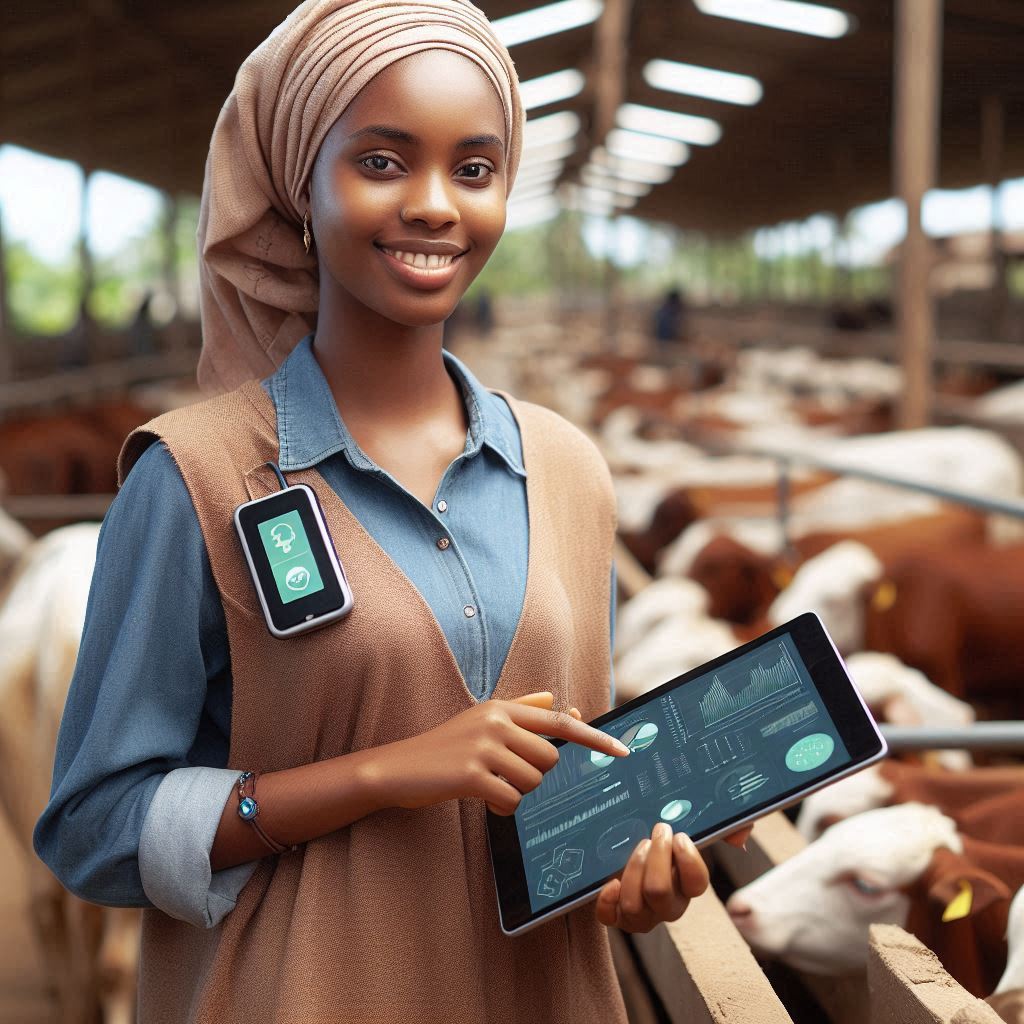Introduction
IoT is revolutionizing livestock production in Nigeria. Farmers use IoT devices to monitor animal health and environmental conditions. These devices collect real-time data, ensuring timely interventions.
IoT sensors track vital signs, detecting illnesses early. This proactive approach reduces livestock mortality rates significantly. Farmers optimize feeding routines using IoT-based data analysis.
This leads to healthier animals and better growth rates. IoT systems enhance farm management efficiency and productivity. Farmers remotely monitor their livestock through connected devices.
This reduces labor costs and improves oversight. IoT also helps in precise tracking of breeding cycles. Farmers can schedule interventions for optimal breeding times. The technology supports sustainable farming practices.
IoT devices monitor resource usage, promoting efficient water and feed consumption. Government and private sector initiatives support IoT adoption. Training programs empower farmers to utilize these technologies effectively.
Embracing IoT in livestock production promises a sustainable and profitable future for Nigerian farmers.
IoT applications in livestock production
Monitoring animal health and behavior
Utilizing IoT in livestock production allows farmers to monitor the health and behavior of their animals in real-time. IoT sensors can track vital signs, such as temperature and heart rate, and alert farmers to any abnormalities.
Tracking livestock location and movements
IoT technology enables farmers to track the location and movements of their livestock using GPS tracking devices. This helps farmers ensure that their animals are in the right place at the right time, preventing loss or theft.
Automating feeding and watering systems
By incorporating IoT devices into feeding and watering systems, farmers can automate the process, ensuring that their livestock receives the right amount of food and water at the right time. This reduces the risk of under-feeding or over-feeding.
Remote management of livestock farms
IoT allows farmers to remotely monitor and manage their livestock farms from anywhere with an internet connection. This enables farmers to make informed decisions based on real-time data, improving overall farm efficiency and productivity.
Basically, the adoption of IoT in Nigerian livestock production has the potential to revolutionize the industry by enhancing animal health, improving farm management practices, and increasing profitability for farmers.
By leveraging IoT applications in monitoring animal health and behavior, tracking livestock location and movements, automating feeding and watering systems, and enabling remote management of livestock farms, Nigerian farmers can significantly benefit from improved productivity and efficiency.
It is essential for farmers to embrace IoT technology and explore its full potential to stay competitive in the ever-evolving livestock industry.
Read: Scholarship and Funding Opportunities for Forestry Students in Nigeria
Benefits of utilizing IoT in Nigerian livestock production
- Improved efficiency and productivity
- Better disease prevention and management
- Reduction of labor costs
- Enhanced decision-making through data analytics
Implementing IoT technology in Nigerian livestock production offers numerous benefits that can revolutionize the industry. Let’s delve deeper into the advantages
Improved Efficiency and Productivity
Integrating IoT devices such as smart sensors and tracking systems can streamline operations on farms, leading to increased efficiency. Farmers can monitor livestock behavior, health, and feed intake in real-time, allowing for quick adjustments to optimize productivity.
Better Disease Prevention and Management
IoT enables continuous monitoring of livestock health parameters, detecting early signs of illness before they escalate.
With real-time data on individual animal conditions, farmers can promptly isolate sick animals, prevent disease spread, and administer timely treatment, ensuring better health outcomes for the entire herd.
Reduction of Labor Costs
Automating certain tasks through IoT technology can significantly reduce the need for manual labor on farms.
Smart devices can handle monitoring, feeding, and data collection efficiently, freeing up labor resources for other essential farm activities. This leads to cost savings and increased profitability for farmers.
Enhanced Decision-Making through Data Analytics
IoT generates vast amounts of data that can be analyzed for actionable insights. By leveraging data analytics tools, farmers can make informed decisions about breeding, feeding practices, disease management, and overall farm operations.
This data-driven approach enables precision farming, where resources are optimized based on real-time information, leading to improved outcomes and sustainable practices.
Therefore, the adoption of IoT in Nigerian livestock production holds immense potential for transforming the industry. From improved efficiency and disease management to cost savings and data-driven decision-making, the benefits are clear.
It is crucial for farmers to embrace this technological advancement to enhance productivity, ensure animal welfare, and drive sustainable growth in the sector.
Read: Field Work & Practical Training in Nigerian Forestry Schools

Challenges and constraints
- High initial investment costs
- Limited infrastructure and connectivity in rural areas
- Cybersecurity concerns
- Skills gap in IoT technology adoption
One of the major challenges facing the utilization of IoT in Nigerian livestock production is the high initial investment costs involved.
Setting up IoT systems such as sensors, data analytics tools, and connectivity technologies requires a significant amount of capital, which may be a barrier for small-scale farmers or ranchers.
Another constraint is the limited infrastructure and connectivity in rural areas where most livestock farms are located. The lack of reliable internet access and power supply hinders the deployment and operation of IoT devices, reducing their effectiveness in monitoring and managing livestock.
Cybersecurity concerns also pose a threat to the adoption of IoT in livestock production.
With the increasing reliance on digital technologies, there is a risk of data breaches, hacking, and other cyber threats that could compromise the privacy and security of livestock data collected through IoT systems.
Furthermore, there is a skills gap in IoT technology adoption among livestock farmers and workers in Nigeria.
Many may not have the technical knowledge or training required to effectively use and maintain IoT devices, limiting the potential benefits that these technologies can offer in improving livestock management practices.
Read: Forestry and Climate Change: Nigeria’s Response and Education
Case studies of successful IoT implementations in Nigerian livestock production
IoT technology has transformed livestock production on several Nigerian farms. These case studies highlight how farms and organizations have successfully implemented IoT solutions.
Examples of Farms or Organizations Using IoT Technology
Sunny Farms in Ogun State exemplifies IoT success. They use IoT devices to monitor cattle health and environmental conditions. Sensors track vital signs such as temperature, heart rate, and activity levels. This real-time data helps farmers identify health issues early.
Green Pastures, a large-scale poultry farm in Kaduna, leverages IoT to optimize feeding and environmental conditions.
IoT sensors measure humidity, temperature, and air quality in poultry houses. Automated systems adjust conditions based on sensor data, ensuring optimal growth environments.
In Lagos, the AgriTech Cooperative uses IoT for dairy production. They implemented smart collars on cows to monitor movement and feeding patterns. Data from these collars informs breeding decisions and health interventions.
Impact of IoT on Their Operations and Outcomes
Sunny Farms witnessed a significant decrease in livestock mortality rates. Early detection of illnesses allowed for timely veterinary interventions. This proactive approach improved overall herd health and productivity.
Green Pastures reported higher poultry growth rates and reduced feed costs. IoT systems ensured precise control of environmental conditions, leading to healthier birds and better yields. The farm also saw a reduction in labor costs due to automation.
The AgriTech Cooperative experienced enhanced dairy production efficiency. Smart collars provided detailed insights into each cow’s health and behavior.
This data-driven approach improved breeding outcomes and milk yield. Farmers also noticed a reduction in disease outbreaks due to timely health monitoring.
Lessons Learned and Best Practices for Implementation
Successful IoT implementation requires careful planning and investment. Sunny Farms learned the importance of training staff to use IoT devices effectively. They conducted regular workshops to ensure everyone understood how to interpret and act on the data.
Green Pastures emphasized the need for reliable internet connectivity. Consistent data transmission is crucial for real-time monitoring and automation. They invested in robust network infrastructure to support their IoT systems.
The AgriTech Cooperative found that starting small and scaling up gradually was beneficial. They initially tested IoT devices on a small group of cows. This approach allowed them to troubleshoot issues before expanding the system farm-wide.
Collaboration with technology providers proved essential for all three cases. These farms worked closely with IoT vendors to customize solutions for their specific needs. Continuous support from tech partners ensured the smooth functioning of IoT systems.
Generally, These case studies illustrate the transformative impact of IoT in Nigerian livestock production. IoT technology enhances health monitoring, environmental control, and overall farm management.
Key lessons include the importance of staff training, reliable connectivity, gradual implementation, and strong partnerships with tech providers.
By embracing IoT, Nigerian farmers can achieve significant improvements in productivity and sustainability. These success stories offer valuable insights and best practices for those looking to integrate IoT into their livestock operations.
Read: Career Prospects in Forestry: Opportunities in Nigeria & Beyond
Conclusion
IoT is transforming livestock production in Nigeria. Farmers use IoT to monitor animal health and environmental conditions efficiently. This technology enables early detection of illnesses, reducing livestock mortality rates.
Automated systems optimize feeding and environmental controls, enhancing productivity. IoT also improves breeding management through precise data analysis. Successful case studies show significant improvements in farm operations.
Farmers report higher yields, reduced costs, and better overall farm management. Key lessons include investing in training and reliable internet connectivity. Collaborating with technology providers ensures customized and effective solutions.
Starting small and scaling up gradually helps manage implementation challenges. IoT adoption promises a sustainable and profitable future for Nigerian livestock farming. By embracing this technology, farmers can achieve significant productivity gains.
IoT’s potential in livestock production is vast and transformative. Nigerian farmers should leverage IoT to enhance their operations and outcomes. The future of Nigerian livestock farming looks brighter with IoT.




